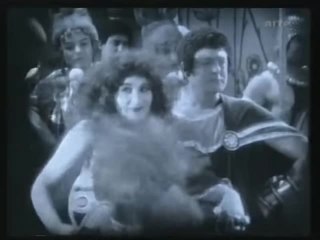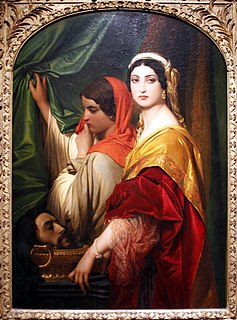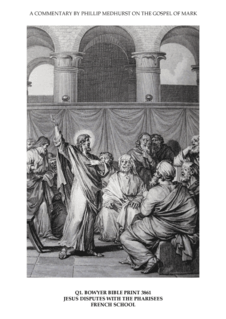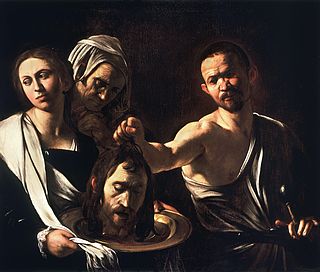Related Research Articles

John the Baptist was a Jewish itinerant preacher in the early 1st century AD. Other titles for John include John the Forerunner in Eastern Christianity, John the Immerser in some Baptist traditions, and the prophet John (Yaḥyā) in Islam. He is sometimes alternatively called John the Baptizer.

Salome, the daughter of Herod II and Herodias, granddaughter of Herod the Great, is known from accounts in the New Testament, where she appears as an unnamed daughter of Herodias, and an account by Flavius Josephus, where the daughter of Herodias is named Salome. In the New Testament, Salome, as unnamed stepdaughter of Herod Antipas, demands and receives the head of John the Baptist. According to Josephus, she was first married to her uncle Philip the Tetrarch, after whose death, she married her cousin Aristobulus of Chalcis, thus becoming queen of Chalcis and Armenia Minor.

Herodias was a princess of the Herodian dynasty of Judaea during the time of the Roman Empire. Historical accounts connect her with John the Baptist's execution.

Herod Antipater, known by the nickname Antipas, was a 1st-century ruler of Galilee and Perea, who bore the title of tetrarch and is referred to as both "Herod the Tetrarch" and "King Herod" in the New Testament, although he never held the title of king. He is widely known today for accounts in the New Testament of his role in events that led to the executions of John the Baptist and Jesus of Nazareth.
Three Tales is a work by Gustave Flaubert that was originally published in French in 1877. It consists of the short stories "A Simple Heart", "Saint Julian the Hospitalier," and "Hérodias".

Matthew 5:17 is the 17th verse of the fifth chapter of the Gospel of Matthew in the New Testament and is part of the Sermon on the Mount. One of the most debated verses in the gospel, this verse begins a new section on Jesus and the Torah, where Jesus discusses the Law and the Prophets.

This article relates to a number of episodes in the New Testament in which Jesus was rejected in accordance with the Jewish tradition which was followed during his lifetime.

Matthew 10:2 is the second verse in the ninth chapter of the Gospel of Matthew in the New Testament.
Matthew 9:20 is a verse in the ninth chapter of the Gospel of Matthew in the New Testament.
Matthew 11:14 is a verse in the eleventh chapter of the Gospel of Matthew in the New Testament.
Matthew 14:3 is a verse in the eleventh chapter of the Gospel of Matthew in the New Testament.
Matthew 14:2 is a verse in the eleventh chapter of the Gospel of Matthew in the New Testament.
Matthew 10:36 is a verse in the ninth chapter of the Gospel of Matthew in the New Testament.
Matthew 14:8 is a verse in the eleventh chapter of the Gospel of Matthew in the New Testament.

The Beheading of Saint John the Baptist, also known as the Decollation of Saint John the Baptist or the Beheading of the Forerunner, is a biblical event and holy day observed by various Christian churches that follow liturgical traditions. The day commemorates the martyrdom by beheading of Saint John the Baptist on the orders of Herod Antipas through the vengeful request of his step-daughter Salome and her mother Herodias.

Salome is a 1953 American Drama Biblical film directed by William Dieterle and produced by Buddy Adler from a screenplay by Harry Kleiner and Jesse Lasky Jr. The music score was by George Duning, the dance music by Daniele Amfitheatrof and the cinematography by Charles Lang. Rita Hayworth's costumes were designed by Jean Louis. Hayworth's dances for this film were choreographed by Valerie Bettis. This film was the last produced by Hayworth's production company, the Beckworth Corporation.
Mariamne II was the third wife of Herod the Great. She was the daughter of Simon Boethus the High Priest. Josephus recounts their wedding thus:
There was one Simon, a citizen of Jerusalem, the son of one Boethus, a citizen of Alexandria, and a priest of great note there; this man had a daughter, who was esteemed the most beautiful woman of that time; and when the people of Jerusalem began to speak much in her commendation, it happened that Herod was much affected with what was said of her; and when he saw the damsel, he was smitten with her beauty, yet did he entirely reject the thoughts of using his authority to abuse her, as believing, what was the truth, that by so doing he should be stigmatized for violence and tyranny; so he thought it best to take the damsel to wife. And while Simon was of a dignity too inferior to be allied to him, but still too considerable to be despised, he governed his inclinations after the most prudent manner, by augmenting the dignity of the family, and making them more honourable; so he immediately deprived Jesus, the son of Phabet, of the high priesthood, and conferred that dignity on Simon, and so joined in affinity with him [by marrying his daughter].

The Apparition(French: L'Apparition) is a painting by French artist Gustave Moreau, painted between 1874 and 1876. It shows the biblical character of Salome dancing in front of Herod Antipas with a vision of John the Baptist's head. The 106 cm high and 72,2 cm wide watercolor held by the Paris Musée d'Orsay elaborates an episode told in the Gospel of Matthew 14:6–11 and Mark 6:21–29. On a feast on the occasion of Herod Antipas' birthday, the princess Salome dances in front of the king and his guest, pleasing him so much he promises her anything she wished for. Incited by her mother Herodias, who was reproved by the imprisoned John the Baptist for her illegitimate marriage to Herod, Salome demands John's head in a charger. Regretful but compelled to keep his word in front of his peers, Herod fulfills Salome's demand. John the Baptist is beheaded, the head brought in a charger and given to Salome, who gives it to her mother.
Matthew 14:6-7 is a set of verses in the eleventh chapter of the Gospel of Matthew in the New Testament.
Matthew 14:9-11 is a verse in the eleventh chapter of the Gospel of Matthew in the New Testament.
References
- ↑ Robert Witham, Annotations on the New Testament of Jesus Christ. Dublin: 1730.
- ↑ John MacEvilly, An Exposition of the Gospel of St. John consisting of an analysis of each chapter and of a Commentary critical, exegetical, doctrinal and moral, Dublin Gill & Son 1879.
- 1 2 3 4 5 6 7 8 9 10 11 12 13 14 15 16 17 18 19 20 "Catena aurea: commentary on the four Gospels, collected out of the works of the Fathers: Volume 6, St. John. Oxford: Parker, 1874. Thomas Aquinas".
 This article incorporates text from this source, which is in the public domain.
This article incorporates text from this source, which is in the public domain.